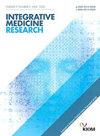以家庭为基础的芳香疗法方案对老年痴呆症患者痴呆行为和心理症状管理的效果:一项带有过程评估的随机对照试验
IF 3
4区 医学
Q2 INTEGRATIVE & COMPLEMENTARY MEDICINE
引用次数: 0
摘要
背景:痴呆症的行为和心理症状(BPSD)对老年痴呆症患者及其家庭照顾者有显著影响。吸入芳香疗法是一种安全有效的治疗BPSD的非药物方法,但尚未在中国人群的家庭环境中进行测试。本研究考察了以家庭为基础的家庭护理人员提供的芳香疗法对OPWDs和家庭护理人员的影响。方法将80名opwd家庭护理人员随机(1:1)分为芳香疗法组和等候组。该计划包括对护理人员进行1小时的培训,以及为期3周的护理人员为opwd提供的芳香疗法干预,每天吸入两次薰衣草精油。进行了全面的过程评价,以评价方案执行情况和参与者的看法。主要结果是opwd患者的BPSD严重程度,次要结果是opwd患者的生活质量(QoL)和护理者的痛苦和护理负担。结果干预组OPWDs的去抑制程度和易怒/不稳定程度(BPSD中的两项)显著降低,生活质量的健康、幸福感和社会关系领域显著改善。照顾者也表现出减轻痛苦和照顾负担,但差异无统计学意义。过程评估显示,大多数参与者接受芳香疗法很好,大多数照顾者愿意在研究结束后继续芳香疗法。结论芳香疗法在居家痴呆治疗中具有可行性和有效性,为今后居家痴呆的研究和护理实践提供有价值的参考。试验注册本研究已在ClinicalTrials.gov (NCT05032664)和中国临床试验注册中心(ChiCTR2100050869)注册。本文章由计算机程序翻译,如有差异,请以英文原文为准。
Effects of a home-based aromatherapy programme for the management of behavioural and psychological symptoms of dementia among older persons with dementia: A randomised controlled trial with process evaluation
Background
Behavioural and psychological symptoms of dementia (BPSD) significantly affect older persons with dementia (OPWDs) and their family caregivers. Inhalation aromatherapy is a safe and effective non-pharmacological approach for BPSD management, but it has not been tested in home-based setting for the Chinese population. This study examined the effects of home-based family caregiver-delivered aromatherapy programme on OPWDs and family caregiver.
Methods
Eighty OPWD-family caregiver dyads were randomised (1:1) to either aromatherapy programme or wait-list control. The programme involved 1-hour training for caregivers, and 3-week caregiver-delivered aromatherapy intervention for OPWDs, using inhalation of lavender essential oil twice a day. A comprehensive process evaluation was conducted to evaluate programme implementation and participants’ perceptions. The primary outcome was the severity of BPSD in OPWDs, with secondary outcomes being OPWDs’ quality of life (QoL) and caregivers’ distress and care burden.
Results
The OPWDs in the intervention group exhibited significantly decreased severity of disinhibition and irritability/lability (two of the BPSD) and improvements in the health and well-being and social relationships domains of QoL. Caregivers also exhibited decreased distress and care burden, but the differences were not statistically significant. The process evaluation revealed that most participants accepted aromatherapy well, and most caregivers were willing to continue aromatherapy after the study.
Conclusion
This study demonstrated that aromatherapy is feasible and effective for managing BPSD in a home-based setting, providing a valuable reference for future research and nursing practice in home-based dementia care.
Trial registration
This study was registered at ClinicalTrials.gov (NCT05032664) and Chinese Clinical Trial Registry (ChiCTR2100050869).
求助全文
通过发布文献求助,成功后即可免费获取论文全文。
去求助
来源期刊

Integrative Medicine Research
Medicine-Complementary and Alternative Medicine
CiteScore
6.50
自引率
2.90%
发文量
65
审稿时长
12 weeks
期刊介绍:
Integrative Medicine Research (IMR) is a quarterly, peer-reviewed journal focused on scientific research for integrative medicine including traditional medicine (emphasis on acupuncture and herbal medicine), complementary and alternative medicine, and systems medicine. The journal includes papers on basic research, clinical research, methodology, theory, computational analysis and modelling, topical reviews, medical history, education and policy based on physiology, pathology, diagnosis and the systems approach in the field of integrative medicine.
 求助内容:
求助内容: 应助结果提醒方式:
应助结果提醒方式:


